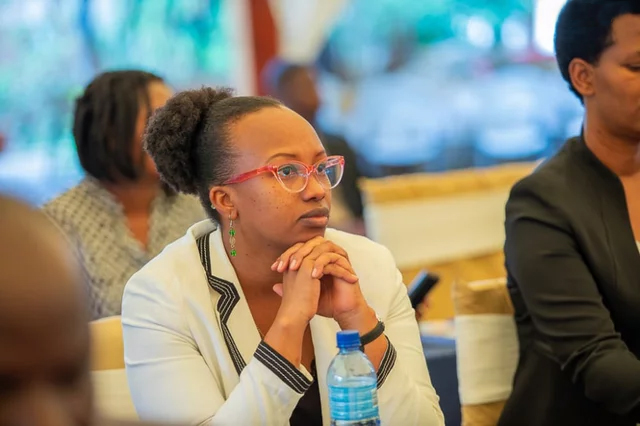As Burundi continues its journey towards economic growth and development and responding of the call of President of the Republic of Burundi launched on November 5 to 6, 2024 during its first ever round Table hosted in Burundi, the private sector remains a key player in driving innovation and creating job opportunities. With favorable government policies, strategic investments, and a focus on sustainability, Burundi is well positioned to become a significant player in the regional and global economy.
Under the coaching and mentoring of EdSF Burundi countrywide, the initiative is rapidly fostering local manufacturing, and enhancing industrial output. While there has been progress in reducing the trade deficit, recent challenges like the COVID-19 pandemic have impacted global trade dynamics. EdSF Burundi’s advocacy efforts for its Doing Business in Burundi Initiative (DBBI) continues to play a vital role in fostering economic growth, enhancing market access, and facilitating business collaborations on a global scale.
In March 21, 2025 in Royal Palace, Bujumbura-Burundi, Eden Stream Foundation (EdSF Burundi) gathered the active private sector in Burundi with an aim of exploring their role in fostering a supportive business environment, and driving economic growth for Burundi’s long-term development aspirations. This takes roots in the similar event that held on December 02 to 06, 2024 with the theme “Entrepreneurship with Zero External Capital is possible!”
EdSF Burundi’s Experts highlighted how domestic and foreign direct investments have been crucial in driving the growth of sectors like tourism, services provision, agriculture, manufacturing, and construction in Burundi.
Those Experts continued to highlight on private sector as an instrumental in promoting the «Made in Burundi» through Doing Business in Burundi Initiative (DBBI). This programme, started in 2024 after the vibrant call of His Excellency the President of Republic of Burundi, is a new entry point of setting well positioned environment for investors in Burundi.
The participants in that workshop were recalled on the DBBI objectives as follows as:
- To advocate for interests of its members and to represent them before the public, national or international partners;
- To serve as a permanent body for dialogue and co-ordination between the Private and the public Sector;
- To promote the activities of its members, including the following:
- To help its members attain a concerted action on their development agenda;
- To solicit for and disseminate such requisite economic or technological information to members;
- To ensure training of its members or employees, through study tours, seminars and courses;
- To organize business events and exhibitions within the country and encourage the participation of its members in such events outside of Burundi;
- To facilitate development of various commercial projects or conduct studies of the same aimed at economic advancement and social security;
- To advise or facilitate acquisition of advisory service to members for diversification or specialization of investments;
- To support and represent members in negotiations or consultations with labour unions and the Ministry responsible for labour;
- To legally represent members in dealing with other partner institutions responsible for the promotion of trade and investments be it national or foreign;
- To support members with difficulties by facilitating them with available information in needy areas (access to finance, ICT technologies, management skills);
- To serve as a platform and network of business development services;
- To negotiate and enter into open collaboration, cooperation and partnership with other organizations on local, regional and international levels for the interests of its members.
The training workshop mainly aimed to organize participants into clusters making easy follow-up in mentoring, coaching and accompaniment. EdSF Burundi Education subsector 3.3 focuses on organizing, coaching and equipping private sector including financial institutions through an outstanding use of enabled-tech ICT.
In total, 4 clusters were organized and categorized as follows:
- Sustainable farming and food production: Cassava Cooperatives, Fishery Cooperatives, tea Cooperatives, Coffee Exporters & Processors Association, Beekeepers’ Cooperatives, Mushroom Producers and Exporters Organization, Horticulture Interprofessiona Organization, Unions of Rice Cooperatives, National Seed Association , Potato Production Cooperatives, Live Animals & Meat Export Organization, Federation of Wheat Cooperatives , Horticulture Exporters Association.
- Industry: Association for Promotion of Metal Works (APROMET), Burundi Tailors Association (BTA), Juice Beverage Producers, Burundian Association for the Promotion of Leather and Leather Products (BAPROLEP), Infrastructures Contractors Association of Burundi (ICAB), Association of Maize Millers in Burundi (AMMIBU), Association Professionelle des Imprimeries Opérant au Burundi (APIOB), Burundi Mining Association (RMA), Burundi Wood Value Chain Association (BVCA), Burundi Association of Producers, Exporters and Sellers of Handicrafts Products (BAPESH), Rice Millers Association (RFMA), Association of Cassava Processors & Exporters in Burundi (ACPEB).
- Trade: Association des Importateurs des Produits Pétroliers au Burundi (ASIMPEB), Association des Commerçants Grossistes et Détaillants au Burundi (ACGDB), Association of Cross-Border Traders of Burundi (ACTB).
- Service: Association of Cleaning Companies of Burundi (ASCCOB), Association of Microfinance Institutions of Burundi (AMIB), Association of Regional Transporter, Burundi (ARTB), Burundi Bankers Association (BBA), Burundi Freight Forwarders Association (BFFA/ADR), Burundi Private Medical Facilities Association (BPMFA), Association des Transporteurs au Burundi (ATB), Beauty Makers Association (BMA), Institution of Engineers Burundi (IEB), IT Hardware & Solutions Cluster, Photographers & Cameramen [Association Professionelle des Photographes & Cameramen du Burundi (APPHOBU)], Burundi Association of Travel Agencies (BATA), Burundi Garages Association (BGA), Burundi Institute of Architects (BIA), Burundi Organization of Professional Management Consultants (BOPC), Burundi Private Schools Association (BUPSA), Burundi Private Security Association (BPSA), Software Developers Association.
On the same note, the participants examined gap and requirements to access credits. However, it was indicated the financial institutions in place are falling short to address key market sectors, including power, finance, construction, water and agriculture. It will also support, through a technical assistance pool, the development of entrepreneurial skills in Burundi and the broader region. Finally, the participants suggested a continuation of Doing Business in Burundi Initiative (DBBI), especially in supporting terms of training, coaching, mentoring and a wider advocacy to various donor for funding a setup of a financing instrument window allowing credits with lowest borrowing interest. The meeting ended with participants’ agreement that they should be the active members of this financing instrument.


